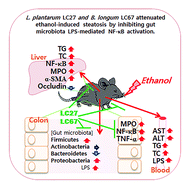当前位置:
X-MOL 学术
›
Food Funct.
›
论文详情
Our official English website, www.x-mol.net, welcomes your
feedback! (Note: you will need to create a separate account there.)
Lactobacillus plantarum LC27 and Bifidobacterium longum LC67 mitigate alcoholic steatosis in mice by inhibiting LPS-mediated NF-κB activation through restoration of the disturbed gut microbiota
Food & Function ( IF 5.1 ) Pub Date : 2018-07-16 , DOI: 10.1039/c8fo00252e Won-Gyeong Kim 1, 2, 3, 4 , Hye In Kim 1, 2, 3, 4 , Eun Kyung Kwon 2, 3, 4, 5 , Myung Joo Han 1, 2, 3, 4 , Dong-Hyun Kim 2, 3, 4, 5
Food & Function ( IF 5.1 ) Pub Date : 2018-07-16 , DOI: 10.1039/c8fo00252e Won-Gyeong Kim 1, 2, 3, 4 , Hye In Kim 1, 2, 3, 4 , Eun Kyung Kwon 2, 3, 4, 5 , Myung Joo Han 1, 2, 3, 4 , Dong-Hyun Kim 2, 3, 4, 5
Affiliation

|
Long-term exposure to ethanol simultaneously causes gastrointestinal inflammation, liver injury, and steatosis. In the present study, we investigated the effects of Bifidobacterium longum LC67, Lactobacillus plantarum LC27, and their mixture (LM) against ethanol-induced steatosis in mice. Exposure to ethanol caused liver damage: it increased ALT, AST, TG, TC, and lipopolysaccharide levels in the blood and induced NF-κB activation in the liver. Oral administration of LC27, LC67, or LM in mice reduced ethanol-induced ALT, AST, TG, and TC levels in the blood and liver. These also suppressed ethanol-induced NF-κB activation and α-smooth muscle actin expression in the liver and increased ethanol-suppressed AMPK activation. Treatment with LC27, LC67, or LM increased ethanol-suppressed alcohol dehydrogenase and acetaldehyde dehydrogenase activities in the liver, as well as tight junction protein expression in the liver and colon. Moreover, treatment with LC27, LC67, or LM restored the ethanol-disturbed gut microbiota composition, such as the increased population of Proteobacteria, and inhibited fecal and blood lipopolysaccharide levels. These inhibited NF-κB activation and increased tight junction protein expression in ethanol- or lipopolysaccharide-stimulated Caco-2 cells. These findings suggest that LC27, LC67, and LM can alleviate alcoholic steatosis by inhibiting LPS-mediated NF-κB activation through restoration of the disturbed gut microbiota.
中文翻译:

植物乳杆菌LC27和长双歧杆菌LC67通过恢复受干扰的肠道菌群来抑制LPS介导的NF-κB活化,从而减轻小鼠的酒精性脂肪变性
长期接触乙醇会同时引起胃肠道炎症,肝损伤和脂肪变性。在本研究中,我们调查了长双歧杆菌LC67,植物乳杆菌的作用LC27及其混合物(LM)对抗小鼠乙醇诱导的脂肪变性。暴露于乙醇会引起肝脏损害:它会增加血液中的ALT,AST,TG,TC和脂多糖水平,并诱导肝脏中的NF-κB活化。在小鼠中口服LC27,LC67或LM可降低乙醇诱导的血液和肝脏中的ALT,AST,TG和TC水平。这些还抑制了乙醇诱导的肝中NF-κB激活和α-平滑肌肌动蛋白的表达,并增加了乙醇抑制的AMPK激活。用LC27,LC67或LM进行治疗可增加乙醇抑制的肝中乙醇脱氢酶和乙醛脱氢酶的活性,以及肝和结肠中紧密连接蛋白的表达。此外,用LC27,LC67或LM处理可以恢复乙醇干扰的肠道菌群的组成,例如变形杆菌的增加,并抑制了粪便和血液中的脂多糖水平。这些在乙醇或脂多糖刺激的Caco-2细胞中抑制了NF-κB的活化并增加了紧密连接蛋白的表达。这些发现表明,LC27,LC67和LM可通过恢复受损肠道菌群来抑制LPS介导的NF-κB活化,从而减轻酒精性脂肪变性。
更新日期:2018-08-15
中文翻译:

植物乳杆菌LC27和长双歧杆菌LC67通过恢复受干扰的肠道菌群来抑制LPS介导的NF-κB活化,从而减轻小鼠的酒精性脂肪变性
长期接触乙醇会同时引起胃肠道炎症,肝损伤和脂肪变性。在本研究中,我们调查了长双歧杆菌LC67,植物乳杆菌的作用LC27及其混合物(LM)对抗小鼠乙醇诱导的脂肪变性。暴露于乙醇会引起肝脏损害:它会增加血液中的ALT,AST,TG,TC和脂多糖水平,并诱导肝脏中的NF-κB活化。在小鼠中口服LC27,LC67或LM可降低乙醇诱导的血液和肝脏中的ALT,AST,TG和TC水平。这些还抑制了乙醇诱导的肝中NF-κB激活和α-平滑肌肌动蛋白的表达,并增加了乙醇抑制的AMPK激活。用LC27,LC67或LM进行治疗可增加乙醇抑制的肝中乙醇脱氢酶和乙醛脱氢酶的活性,以及肝和结肠中紧密连接蛋白的表达。此外,用LC27,LC67或LM处理可以恢复乙醇干扰的肠道菌群的组成,例如变形杆菌的增加,并抑制了粪便和血液中的脂多糖水平。这些在乙醇或脂多糖刺激的Caco-2细胞中抑制了NF-κB的活化并增加了紧密连接蛋白的表达。这些发现表明,LC27,LC67和LM可通过恢复受损肠道菌群来抑制LPS介导的NF-κB活化,从而减轻酒精性脂肪变性。











































 京公网安备 11010802027423号
京公网安备 11010802027423号